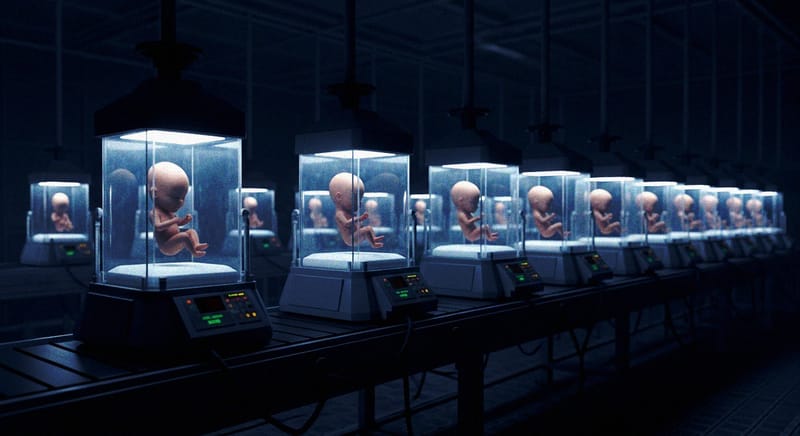IVF is not Pro-Life. Here's Why.
In this article, we will examine what exactly happens during IVF – Including its consequences, potential harms, and moral implications.

IVF. Something that even some pro-lifers deem a moral and acceptable option, because through the process, life is created. But there is a problem with this stance, which, in appearance, can fool us. And it has, unfortunately.
Being pro-life is fighting for the dignity of all lives, including the embryos. And interestingly enough, when talking about abortion, we pro-lifers do say that the embryos have value and abortion is wrong from the moment of conception. But there is a slippery slope with accepting IVF as a pro-lifer. Yes, a life is formed, and a couple can have a child. But the methods need to be questioned. And as people, and as Christians, we have to pay close attention to the way we proceed with things, and not come at the expense of causing harm to others and violating God’s design.
In this article, we will examine what exactly happens during IVF, including its consequences, potential harms, and moral implications, viewed through a scientific lens, with a hint of a Christian response.
Before moving forward…
We must clear something important before going further: All children who have been conceived through IVF and have received this gift, that is, life, are themselves a gift from God. They are precious, and through an immoral way, something beautiful and sacred came through it. So their value are not different from those who were conceived naturally. And desiring a child is not bad.
However, this should not, as a society, justify continuing an immoral act. An act where, when one child lives a full life, several other babies are killed in the process or are used as an experiment. Taking someone else’s dignity should never be the means to run to. And our culture should stop preying on the emotional struggle and grief of those couples who are sterile and desire a child, to achieve selfish desires and profit off of them. And treating children as objects and testing on them. Our desires for something that is in itself good, like wanting children and a family, should not overpass morality, because then, it becomes selfish.
Our subjective intentions, even the good intentions, cannot dominate objective reality. Many pro-lifers tend to have a softer and flexible position about IVF. And if we truly value life and want to defend it with our best efforts, there can be no exceptions.
If you are struggling to conceive a baby and are suffering due to infertility, just know that you are not alone, and there is a way to bring this dream into your life and homes. I hope and pray that this article will help you with that. Help you to go closer to that, in an ethical way.
What is IVF?
IVF is one form of assisted reproductive technology. It involves combining sperm and one or more eggs outside a woman’s body in a laboratory.

Quick facts:
- 1960s-1970s: Research into human oocyte fertilization led to the possibility of IVF.
- 1978: Dr. Patrick Steptoe and Sir Robert Edwards achieved the first successful IVF birth with the birth of Louise Brown.
- 1 in 6 couples suffer worldwide from infertility.
The Process
To get the gametes, men usually masturbate, and women’s ovaries have to be dangerously stimulated by drugs. Technicians examine the semen and eggs and select the “healthiest”, creating with them multiple human embryos (which are human beings) in petri dishes. The embryos are then examined under microscopes, and any that show defects are killed. “Healthy” embryos are grown for a few days, tests are performed on them to make sure they “pass” quality control, and a few are selected for transfer to the woman’s womb or the womb of a gestational surrogate. Other embryos are killed or frozen and selected for various purposes, like donation to other patients, embryo-destructive research, or for future pregnancies etc.
What does IVF take away?
IVF is dehumanizing. As we recognize in the process of IVF, children have become test subjects. Their dignity is attacked. In vitro fertilization produces the destruction of discarded embryos, and in the case of multiple embryo transfer, is often accompanied by selective reduction of implanted embryos. The principle of this procedure is evil, involving the destruction of human embryos.
And the heartbreak of infertility puts couples in a vulnerable situation. And we must be careful that our desires that are in nature good, like wanting children, do not become an enemy to another child. It can also transform into selfishness. But the heartbreak of infertility also makes them vulnerable to an industry that gains its profit through their suffering and ultimately the lives of other children.
Why Catholics, and ultimately all Christians, cannot support IVF morally
Unfortunately, even when the Catholic Church condemns IVF, many Catholics do choose IVF and disagree with the Church’s stance on IVF. A 2013 Pew Research survey found that only 13% of U.S. Catholics believe IVF is morally wrong. This is heartbreaking to know as a Catholic and alarming. And many non-Catholics do not view IVF as immoral as well. If we don’t defend all lives and their dignity as Christians/pro-lifers, we contradict ourselves.
The Catholic Church supports the pursuit of finding both technological and natural ways to overcome the unfortunate and painful situation of couples’ infertility. “Since children are a wonderful gift of marriage, it is a good thing to try to overcome the obstacles which prevent children from being conceived and born.” However, Catechism of the Catholic Church (CCC) states:
“One may never do evil so that good may result from it” (1789). This principle is tied to the truth that certain acts are intrinsically evil. “There are some concrete acts … that it is always wrong to choose, because choosing them entails a disorder of the will, that is, a moral evil” (CCC 1755)…
In 1987, the Sacred Congregation for the Doctrine of the Faith issued a document known as Donum Vitae (“The Gift of Life”) addressing the moral point of view of the modern fertility procedure.
Another problem the Church addresses is that IVF separates the procreative and unitive meaning of the conjugal act. It seeks to procreate without the one-flesh union. This is a violation of the dignity of the human person because “the child has the right…to be the fruit of the specific act of the conjugal love of his parents; and he also has the right to be respected as a person from the moment of his conception.”
The Dark Reality
In IVF, the embryos created in the lab are graded on their “quality.” If any embryos don’t hold up to the standard, they are discarded, frozen, or even donated to research and eventually destroyed. These are human lives being destroyed because they have “undesirable” genetics.
IVF is modern-day eugenics. No different from the Nazis, who eliminated anyone who was ‘’unfit’’ for their ideal society. And they abused science to promote it.
Something else that occurs is embryo “grading” — a subjective inspection to assess an embryo’s potential to successfully implant and grow to live birth (with “unfit” embryos destroyed). Preimplantation genetic testing also should not be conducted. This testing intends to select for desired traits and against unwanted ones. For example, if a couple only wants a girl, male embryos would be discarded. Couples who desire a child without certain birth defects may opt to destroy embryos that might have trisomy 21 (Down syndrome), etc. Do you start to see the enormous moral problem?
Dr. Lauren Rubal, a board-certified OB/GYN and integrative medicine physician with a subspecialty in reproductive endocrinology and infertility, is among many doctors who have changed their minds on IVF and stopped offering it to their patients, acknowledging the immorality behind this process. And, instead of offering moral options to the couple longing for a family, without harming other children in the process.
“A recent study showed that the number of embryos needed to optimize cumulative live birth rates was nine,” said Rubal.
“This means that up to eight embryos may not survive or will be frozen or destroyed. So effectively, you are choosing the death of nine to get the life of one. Even though you have good intentions — you want life, you’re also choosing all of the consequences that follow.”
In choosing the deaths of other lives, IVF is not a pro-life choice. Another moral problem we face is the fact that nearly 1.5 million embryos are believed to be currently frozen in the U.S. alone. This process treats these children like property. This is also an orphan crisis.
Dr. Rubal makes us notice something else: ‘’women who undergo IVF have two times the risk of life-threatening pregnancy complications, and a 26% increased risk of preterm birth. The children conceived through IVF who survive to birth have a 40% increased chance of birth defects and about double the chance of having autism. Recent studies have shown a significant risk of maternal death and morbidity associated with ovarian hyperstimulation syndrome and multiple pregnancies after IVF.’’
The National Institute of Health reports the following: ‘’In the Netherlands, the overall mortality due to IVF is higher than the overall maternal mortality rate. The increased mortality is due to multiple pregnancies and ovarian hyperstimulation syndrome. In an editorial in the British Journal of Medicine, Dr. Susan Bewley noted that in the United Kingdom between 2003 and 2005, there were two deaths due to abortion. In contrast, there were seven deaths related to complications from IVF. These cases go unreported.’’
The National Library of Medicine in 2020 reports:
“Today, almost 3% of all children in Germany — and in countries with a very liberal policy, like Denmark, 6% of all children are conceived by IVF. In every class at school, there is one IVF child.”
Researchers have found that the risks of heart defects, musculoskeletal and central nervous system malformations, preterm birth, and low birth weight are increased in children conceived by in vitro fertilization (IVF). The risks seem to be based on maternal and paternal factors, but also on IVF itself.
The Catholic News Agency reports that more die from IVF than abortion, stating:
“The CDC estimates that more than 238,000 patients attempted IVF in 2021. If clinics created between seven and eight embryos for every patient, that would yield about 1.6 million to 1.9 million embryos over a year. Despite these high numbers, fewer than 100,000 embryos were brought to term, which suggests that somewhere between 1.5 million and 1.8 million embryos created through IVF were never born. Alternatively, the abortion industry claimed about 985,000 lives from July 2022 through June 2023, suggesting that the IVF industry could be ending nearly twice as many human lives every year.”
IVF is not an option. Then what is?
NaProTechnology is one ethical alternative to IVF. One study has confirmed earlier findings that NaProTechnology results in several live births, without the danger to women and newborn infants. Adoption of born children is another ethical option. Many children seek a stable, loving home. One can even adopt embryos that have been abandoned as well. At the end of this article, you will find the source for this, if interested.
What is NaProTechnology?
NaProTechnology (NPT) — that makes use of a woman’s natural fertile cycles, and in vitro fertilization (IVF), which is a form of assisted reproductive technology (ART) and which seeks to replace the natural means of procreation.
Restorative reproductive medicine (RRM) focuses on this. By addressing the underlying causes of infertility, rather than directly manipulating the reproductive process. It is safer, moral, and even more affordable than IVF, and improves the health of the patients. Multiple studies have shown that through RRM, an equal or even higher birth rate occurs than with IVF.
Let’s summarise:
● IVF neglects the underlying health issues, and costs on average 20,000$ per cycle. Remember, couples need multiple cycles.
● Costs 4x more per birth compared with RRM, and has a low success rate (10%).
● Has a high human embryo loss rate: 85% of the human embryos are either frozen, discarded, used for experimentation..
In the US alone, over 1 million embryos are frozen. In 2019, Europe saw 335,744 frozen embryo replacement cycles, according to the European Society of Human Reproduction and Embryology (ESHRE), and 2019 over 1 million ART treatment cycles were reported. In the UK, embryo storage cycles increased to 10,719 in 2021, a 30% increase from 2019, according to the HFEA. In Spain, there are 668,082 embryos in the conservation banks, and about 10% (around 60,005) of them have an uncertain fate and risk of being abandoned, according to the latest data provided by the Spanish Fertility Society (SEF).
RRM helps you get pregnant ethically, yet also values the health of the woman, like PCOS, hormonal imbalances, endometriosis, etc. This demonstrates that RRM provides the longing desire to build a family ethically, without sacrificing other children throughout the process, and prioritizes health and addresses the root cause of infertility.
What we must confront
Donor sperm or eggs can introduce problems of identity. Research shows that individuals conceived with donor sperm often experience confusion later in life. IVF is a popular option for same-sex couples, like surrogacy; an article about this subject will be written soon. Also, the ‘trend’ of women choosing to become single mothers and not wanting to carry a child, like some celebrities have done, uses surrogacy or IVF as an option.
These are too ‘controversial’ to talk about, and one will most likely be called all sorts of names, and accused of shaming women wanting to become mothers, etc. However, this is for the good of all, especially the most innocent. The destruction of human embryos, the danger to women and newborn infants, and the replacement of the marital act in procreation are all consequences of IVF, which have a long-term impact, as in our culture, for example.
I would more than encourage family life, especially as I’m a Catholic, but to do it evilly is not the right way. It shouldn’t sit right with us to stay silent or neutral about these realities, just because of how others will perceive us. Sinning in vanity is too common, and I have personally committed this sin too often in the past, and it hasn’t led to the goodwill of others. We also must share these truths with others, as many people, including couples considering IVF, who most likely are not informed of this dark reality. And to know that there is an ethical, healthier, and even more secure chance, and a way to bring a baby into this world with love.
We must bring the darkness into the light. And defend every life. Yes, including the human embryos.
Sources
An adoption resource: https://christianadoptions.org/https://studentsforlife.org/2024/02/23/what-to-expect-when-youre-expecting-to-talk-about-invitro-fertilization-ivf/
https://studentsforlife.org/learn/in-vitro-fertilization/
https://abolitionistsrising.com/ivf/
https://www.adoptingembryos.com/ — You can adopt the abandoned embryos.






